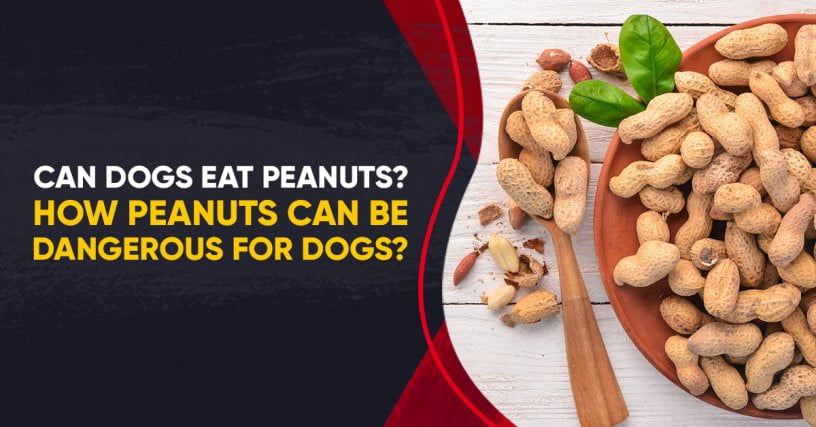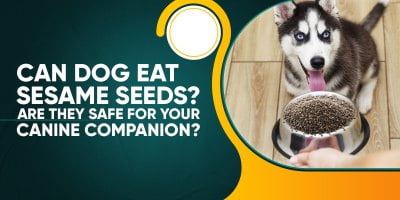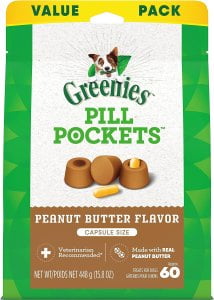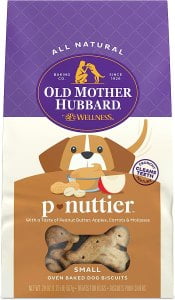As we all know dogs are very close to our hearts and they are very much a part of our family. But sometimes dogs demand certain food like peanuts to eat. Is it safe for dogs to eat peanuts? There are a lot of things we don’t know. This blog will help you gather more information about this topic. If you are a dog owner, you will have a better idea if can dog eats peanuts or not, as well as peanut butter.
Table of contents
Estimated reading time: 7 minutes
Can Dogs Eat Peanuts and Why?
The short answer is that YES, dogs can eat peanuts. Dogs can eat peanuts and the occasional peanut will not hurt them. However, peanuts are not great for dogs and there are concerns about feeding them to your dog.
How Are Peanuts Good For Dogs?
Peanuts are a valuable source of vitamins and nutrients that your dog desires, as they are high in B6, E, niacin, protein, and healthy fat. If you’re looking for treats that will give your furry best friend the boost it needs to maintain good health, then peanuts may be just what you need.
How Peanuts Can Be Dangerous For Dogs?
There are several ways peanuts can be dangerous for your dog’s health.
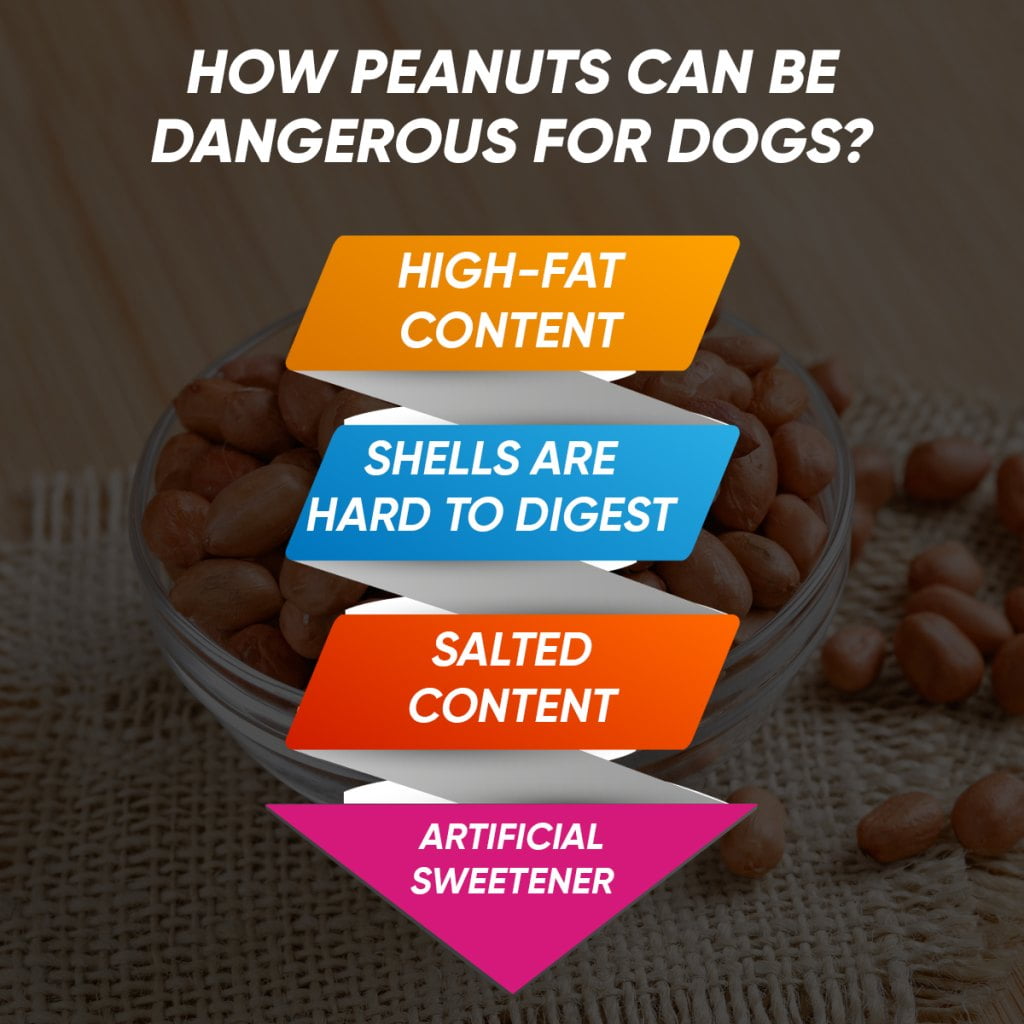
High-Fat Content
Peanuts are high in fat, so it’s important to give them to your dog only occasionally and not all of the time. This is because too much of a good thing is not healthy for any living thing. Too much fat, in the long run, can lead to pancreatitis, but even more so in dogs than humans. You’ll also want to make sure your dog isn’t allergic to peanuts.
Shells Are Hard To Digest
Peanut shells are hard to digest in the gastrointestinal tract and cause serious health concerns. Due to their small size and inability to dissolve easily and because of the hard shell peanuts they are difficult to digest.
Although they may not seem like a hazard by looking at them, peanut shells can make it more difficult for a pup’s digestive system to break and cause obstruction in the digestive tract.
Salted Content
Peanuts aren’t healthy snacks for dogs because of their high levels of sodium, which can be toxic to the animal. Since artificial sweeteners are often found in peanut butter and some other salty foods like sausage. So your dog could be at risk for a synthetic chemical-related illness if you feed it too many of these kinds of snacks regularly.
Artificial Sweetener
It’s always not safe to use Xylitol on your pet animals, especially dogs. The xylitol is harmful to the pets, so be attentive and careful if you are giving your dog a peanut that has Xylitol included. Sometimes it’s not even necessary that much xylitol harm your doggy.
Even just a small amount of toxicity can change their body chemistry balance and make them worse. If your dog eats peanuts with xylitol it may cause an unwanted health problem like liver failure or hypoglycemia (abnormally low blood sugar). They might soon exhibit signs like unsteadiness, disorientation, panting, and seizures.

Can Dogs Eat Raw Peanuts?
Dog owners need to be aware that raw peanuts can play a vital role in decreasing their pet’s health. You need to make sure that if you have a fresh supply of peanuts it isn’t left where your dog can get at it.
Dogs are attracted to the tasty peanut and thus are more susceptible to getting sick since they don’t know any better than eat what’s placed before them. This can prove dangerous as small amounts of this fungus cause acute liver failure.
The signs most typically appear within one to two days after consumption but could take up to several weeks for symptoms to surface. If a dog has been diagnosed with this toxin but is showing no symptoms of illness, the dog may not need any medication. He only requires a special diet containing the minimum amount of protein needed for proper nutritional value.
Can Dogs Suffer From Peanut Allergy?
YES, dogs can also suffer from peanut allergies. Although peanut allergy is rare in dogs, pet owners should be alert to the symptoms that their animal might show.
Mild allergic reactions in dogs include redness around their eyes and excessive licking of their fur and hot spots. While in some cases it may lead to severe swelling due to difficulty breathing.
As a result, one may need to use first aid to alleviate this problem in major cases you may need professional care if your doggy is not getting better on its own.
Can Dogs Eat Peanut Butter? If Yes, How to Feed Peanut Butter to Your Dog?
Before feeding peanuts to your dog it’s best to consult your vet about how much to feed your dog. Your vet can also tell you whether it is healthier to feed your dog peanut butter or not. If your dog’s vet gives the okay, give your canine a lightly cooked peanut treat.
Ensure peanuts you buy are aged or raw and have been baked, roasted, or boiled to reduce the risk of fungus. When offering a treat, make certain that the peanuts are chewed fully by your dog to lessen the chance of gastrointestinal blockage.
One way to help your dog avoid this issue is to purchase or make homemade peanut butter. Please note that while some commercial brands of peanut butter are safe for dogs, many contain xylitol, an artificial sweetener that is toxic for dogs.
The same goes with candies and desserts so it’s important to be careful when feeding your dog food that isn’t specifically labeled or marketed as “pet treats“.
Conclusion
There are many things that we can eat that are perfectly safe for dogs. Peanut butter is one of them, as long as you don’t give them many peanuts. Peanuts are legumes, and they have a different protein structure than other nuts. So, a dog can eat peanuts or peanut butter, but they need to eat small amounts. If they eat too many peanuts, they can develop a stomach ache. Keep in check the salted peanuts and those that contain artificial sweeteners.

Read More:

